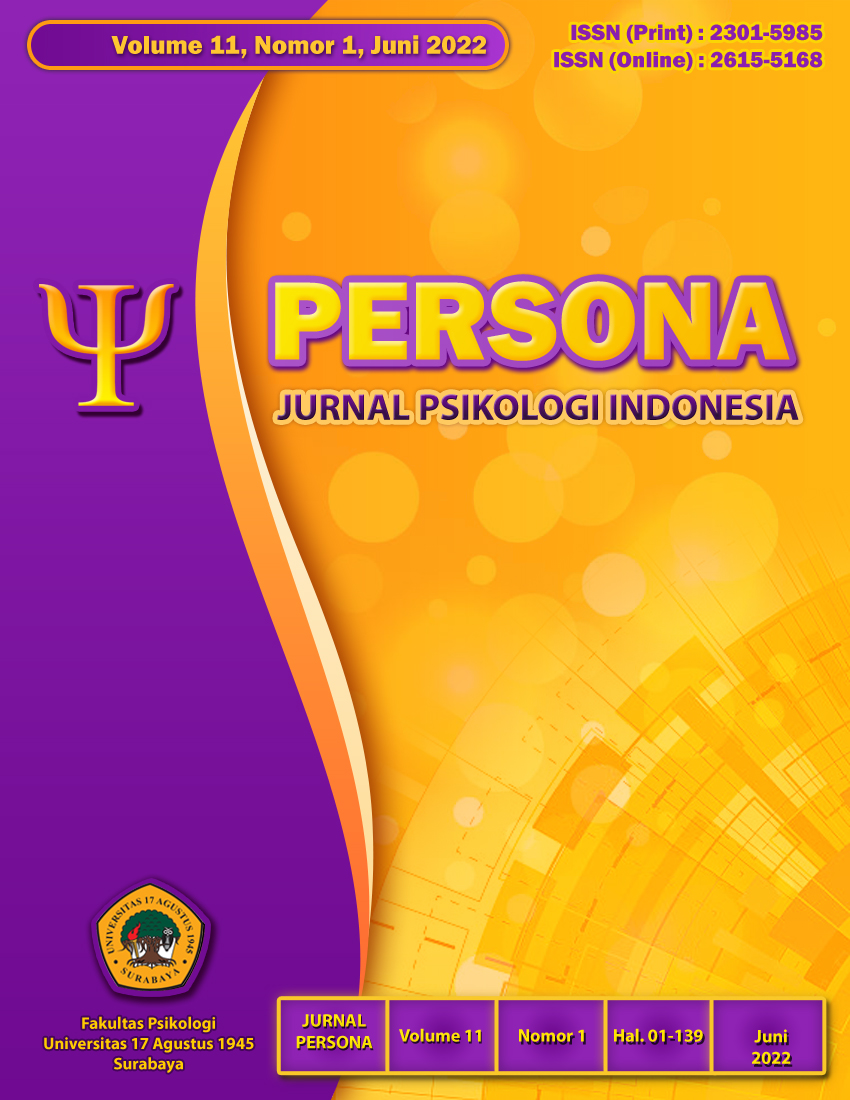Psikoterapi kognitif perilaku berbasis nilai spiritual untuk meningkatkan regulasi diri residivis pembegalan
DOI:
https://doi.org/10.30996/persona.v11i1.6275Keywords:
cognitive behavioral psychotherapy, recidivist; spoliation, self-regulation, spiritual value, spoliationAbstract
Abstract
The prevalence of recidivist tendencies in convicts of burglary cases in Pasuruan is still high. There needs to be a special intervention to reduce the recidivism tendency. The aims of this study were 1) to explore the recidivist behavior of the robbery case in Pasuruan; 2) to develop an effective spiritual value-based cognitive behavioral psychotherapy model for prisoners of burglary cases in Pasuruan. The method used is development research with ADDIE stages (Analysis, Design, Development, Implementation, and Evaluation). The results showed that 1) the results of the exploration of recidivist behavior that were manifested in the analysis of the S-O-R-C function showed that recidivist prisoners had low self-regulation and had a lot of irrational thoughts on cognitive aspects, and had spiritual values that had not been internalized; 2) the results of developing a spiritual value-based cognitive behavioral psychotherapy model in five sessions in the form of modules have been highly validated by experts and potential users. The results of the limited group trial showed differences in self-regulation of recidivist subjects before and after being given psychotherapy (p<0.05). Thus, it can be concluded that the psychotherapeutic model developed is effective in increasing the self-regulation of delinquent recidivists.
Keywords: Cognitive behavioral psychotherapy; recidivist; spiritual value; self-regulation; spoliation
Abstrak
Prevalensi kecenderungan residivis pada narapidana kasus pembegalan di Pasuruan masih tinggi. Perlu ada intervensi khusus untuk mengurangi kecenderungan residivis tersebut. Tujuan penelitian ini adalah 1) mengeksplorasi perilaku residivis kasus pembegalan di Pasuruan; 2) mengembangkan model psikoterapi kognitif perilaku berbasis nilai spiritual yang efektif bagi narapidana kasus pembegalan di Pasuruan. Metode yang digunakan adalah penelitian pengembangan dengan tahapan ADDIE (Analysis, Design, Development, Implementation, dan Evaluation). Hasil penelitian menunjukkan bahwa 1) hasil eksplorasi perilaku residivis yang diwujudkan pada analisis fungsi S-O-R-C menunjukkan bahwa narapidana residivis memiliki regulasi diri rendah dan memiliki banyak pemikiran irasional pada aspek kognitif, serta memiliki nilai spiritual yang belum terinternalisasi; 2) hasil pengembangan model psikoterapi kognitif perilaku berbasis nilai spiritual dalam lima sesi yang berwujud modul telah tervalidasi sangat tinggi oleh ahli dan calon pengguna. Hasil uji coba kelompok terbatas menunjukkan bahwa ada perbedaan regulasi diri subjek residivis sebelum dan sesudah diberikan psikoterapi (p<0,05). Dengan demikian, dapat disimpulkan bahwa model psikoterapi yang dikembangkan efektif dalam meningkatkan regulasi diri residivis pembegalan.
Kata kunci: nilai spiritual; pembegalan; psikoterapi kognitif perilaku; regulasi diri; residivis
Downloads
References
Abdullah, Mohamad Azmi, and Rosita
Chong. (2014). "Financial
Literacy: An Exploratory Review
of theLiterature and Future Research."Journal of Emerging
Economies & Islamic
Research2.3
Ani Caroline Grigion Potrich &
Kelmara Mendes Vieira &
Wesley Mendes-Da-Silva,
Downloads
Published
Issue
Section
License
The author who will publish the manuscript at Persona: Jurnal Psikologi Indonesia, agree to the following terms:
1. Authors retain copyright and grant the journal right of first publication with the work simultaneously licensed under a Creative Commons Attribution ShareAlike License that allows others to share the work with an acknowledgment of the work's authorship and initial publication in this journal.
2. Authors are able to enter into separate, additional contractual arrangements for the non-exclusive distribution of the journal's published version of the work (e.g., post it to an institutional repository or publish it in a book), with an acknowledgment of its initial publication in this journal.
3. Authors are permitted and encouraged to post their work online (e.g., in institutional repositories, pre-prints sites or on their website) prior to and during the submission process, as it can lead to productive exchanges, as well as earlier and greater dissemination of published work






